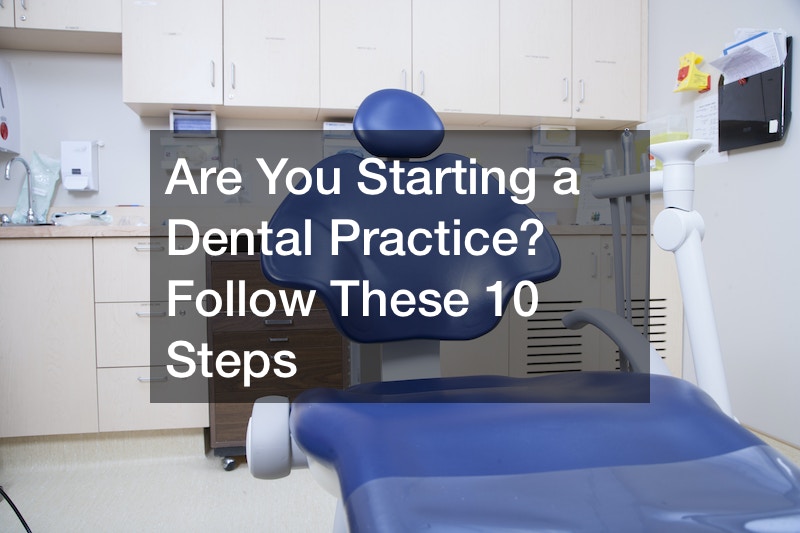Are you starting a dental practice? If you are, you’ve come to the right place. Before diving in too deep, it’s important to understand that this step requires you to don not only a dentist’s hat but a business person’s too. Just as with any other business, several factors will have to be considered before opening the doors of your dental practice to welcome the first patient. Here are ten steps that will nudge you in the right direction:
1. Set Your Budget

Are you starting your journey toward owning your dental practice? Whether you intend to set up the business from scratch or want to buy an existing one, you can expect to spend about $350000 to $500000, according to the American Dental Association. A large percentage of the initial capital goes into construction. For example, when laying the foundation of a building, you’ll need concrete. On average, concrete companies charge $125 for each cubic yard.
2. Get a Business Plan
It’s often said that failing to plan is planning to fail. Therefore, creating a business plan is an important step when you’re starting a dental practice. It should indicate all financial details, such as earnings and cost, and strategies like marketing. Having a business plan not only helps you track progress within the business, but also helps potential investors gauge whether or not the business is worth investing in. Should you require financing from money lending establishments such as banks, a business plan will help the lender determine your ability to pay back the loan. The last thing you want is for your business to be doomed before it even starts, so ensure you have a comprehensive business plan.
3. Choose the Location of Your Business

Are you starting the process of determining where to establish your dental practice facility? The location you pick to set up your dental practice will very well affect your business. You want to set up your practice in an area where the business has the potential to grow. You may be thinking to yourself, “I can always move to a different location if this doesn’t work.’ Yes, you have the option of moving; however, is it viable? Have you considered the cost implications of shifting a business? To find a location where you don’t need to think about relocating, there are a few factors to consider:
a. Are you starting a dental clinic or a dental office? Whichever the case, you’ll need to be seen. Consider these two scenarios; clinic A is located on the main road where everyone can see, and clinic B is located along a dark alley. Which of the two locations is more likely to get a walk-in client for a dental service? Without a doubt, clinic A has a better chance than B. To further enhance visibility, clinic A may decide to set up signage indicating its operating hours as well as all the services offered. This will ensure that any potential client has a clue about the services they can get from the clinic.
b. Another important factor to consider is competition. It’s your responsibility to do due diligence and research on the competition in your area of choice. The ratio of dentists to the population will directly impact your business. Unless you can expand, your business will be overwhelmed if the number of clients seeking services is higher than that of available dentists. On the other hand, should you opt for an area that’s already flooded with clinics but not enough clients, the business will flop.
c. Parking and accessibility are among the main factors clients consider when determining where to get a dental service. It’s important to choose a location with sufficient parking and which can accommodate everyone, including the old and disabled.
4. Determine How Much Space You Need
After determining the location to set up your dental practice, the next step is determining how much space you need. The amount of space you’ll need depends on how big or small the establishment is, but an average treatment room is about 400 to 500 square feet, according to Ali Oromchian, the founding attorney of Dental and Medical Counsel.
5. Plan Your Space

Now that you have the location and space, you need to think about how you’re going to set it up. You’ll need to consider all the needs and wants of your space, so your dental practice is not only aesthetically pleasing but also functional.
Having a well-ventilated space will go a long way in curbing the spread of infections. Since the pandemic, more businesses, including dental clinics, have been intentional about ensuring proper ventilation. If you notice a problem with the AC in your space, don’t hesitate to contact your local AC repair company for a maintenance service.
You also need to ensure that you have an effective water filtration system in your establishment. As much as the municipal water running through the pipes and taps in your business is pre-filtered, it’s not completely safe for use in dentistry as it may still contain traces of chemicals, biological contaminants, and biofilm, bacteria that can result in infections.
Unfortunately, infections aren’t the only hazards you have to worry about as a result of an improper filtration process. When the problem is left unresolved for a long time, the bacteria and chemicals will eventually clog the pipes and taps in your practice, resulting in plumbing issues and mold growth. If this happens, you’ll incur additional costs for contracting a mold remediation service.
The need to have a constant supply of energy is growing with each passing day. The most common use of solar energy is lighting up spaces. However, the demand for solar energy in dentistry isn’t only for lighting but for aiding in the production of solar-powered Plaster of Paris, which is of better quality than that manufactured from other energy sources such as coal. Therefore, it would be important to seek out companies within the area that offer solar services to ensure your clients get nothing but the best of Plaster of Paris.
6. Think About Equipment
Are you starting a dental practice? Equipment is a fundamental component to consider. On average, expect to spend $25000 to $400000 on dental equipment. Such equipment includes surgical instruments, sterilization equipment, custom computers, dental lasers, and Intraoral cameras. In addition to this equipment, you’ll need to ensure you have an adequate metal supply for metals such as titanium, stainless steel, and cobalt chromium, all of which can be used in a variety of dental services, such as fillings, dental implants, and crowns.
7. Get Financing

Finances are at the core of every successful dental practice. Are you starting the practice on your own or going in with a partner? Whatever the case, you’ll need to have either saved up enough to start the business or reach out to banks and other money-lending facilities for a loan. According to Titan Web Agency, the upfront cost of opening a dental practice is estimated to be about $475000.
Getting a loan isn’t a walk in the park; you’ll need to get a lender who not only has the capacity but is also willing to lend you the amount you need to start your business. Don’t be in a rush when scouting for financing. Research the different money lending facilities and choose the one that has the best terms, especially on the repayment plans and interest that the loan will accrue.
8. Marketing
As earlier indicated, being seen is very important in business, and ensuring that your presence is felt not only at your physical location but in the online market as well is very important. This could be achieved through social media platforms and websites. Luckily, you can outsource personnel to help manage your social media platforms as well as create a website for your practice that generates leads.
Marketing is crucial for any small business, but especially dental offices! If you’re a dentist and are looking for ways to market yourself, you have a plethora of options. The first step is fairly simple. It’s always good to make a website for your company. When you have a good-looking website, you can market your services and lay out all the information your customers need inside one, convenient place. You can always hire online marketing services so your site ranks well on Google and creates more website foot traffic. Outside of digital marketing, there’s always word of mouth! Make sure your satisfied clients spread the word and tell others that they’ve enjoyed having you as their dentist. You’ll have more people walking in through your door for new appointments in no time at all! Don’t be afraid to ask for other dental offices for advice. See how they market themselves and try to borrow some techniques from them. If it worked for them, there’s probably a good chance it will work out for you too! Nonetheless, always make sure you create good marketing habits for your business.
9. Workforce Needs
You might not want to involve another dentist at the start of your business; however, you’ll need personnel to help with other daily tasks. For example, you’ll need a receptionist to help book clients for you and keep your calendar, a dental assistant to help you in the treatment rooms, and an IT person who may be contacted should the need arise.
10. Licenses and Permits
The last step in your journey towards owning a dental practice is ensuring you have all the necessary licenses and permits to operate your business in that particular area. Some of these requirements include; a tax ID number, business organization documents, and a license from the state where your business operates.
Grow Your Clinical Network
Contact all the experts in your field and let them know you have a new practice. Inform them of your goals for the practice and your strategy for growing your clientele. Tell them what sets you apart from the other dentists in the region, and request that they recommend a patient if they can. Consider starting a new dentistry study group in your community or joining one that already exists to start establishing roots fast.
What Are Some Examples of Services That You Could Offer at Your Dental Practice?
Are you starting a dental practice and aren’t sure of the services to offer? Consider the following:
Cosmetic Dentistry
A trip to the dentist isn’t always a dreadful one. With modern-day technology and social media, people have become more interested in how they look, and this has consequently led to an increase in the number of people visiting dental clinics in a bid to achieve a picture-perfect smile or super-white teeth. According to a 2021 report, the global cosmetic dentistry industry was valued at $29.6 billion and is projected to grow at a 13% annual rate. Some of the most popular cosmetic dental procedures include teeth whitening, gum contouring, and dental bonding.
Orthodontic Dentistry
Orthodontic dentistry typically involves the use of braces, expanders, retainers, clear aligners, and other treatments to align teeth. According to Indeed, an orthodontist operating in the US earns an average sum of $1386 daily.
General Dentistry
As the title implies, a general dentist is concerned with the general health of teeth and oral hygiene.
Oral Maxillofacial Dentistry
Oral maxillofacial dentistry primarily focuses on the extraction of wisdom teeth. However, these dentists also perform other services such as implants, TMJ surgeries, jaw alignment, correct accident-related facial traumas, and biopsies.
Career Paths in Dentistry
Are you starting your career as a dentist? Before you can open your dental practice, you may want to work in an established business within the industry and eventually work your way up. There are several paths you can take.
You can start by working as a dental assistant. This personnel assists dentists as they work in the treatment rooms. Their job description typically entails preparing and sterilizing all equipment, taking a patient’s teeth impressions, developing X–rays, as well as giving patients advice on how best to care for their teeth. In some states, you’ll need to take and pass an exam to practice as a dental assistant, while other states don’t have such restrictions.
You can also start as a dental hygienist. The duties of a dental hygienist are a bit more demanding than those of an assistant. They perform duties such as cancer screening and dental cleaning, and with guidance from a dentist, they may offer preventative dental care. You can also start as a dental laboratory technician. These laboratory technicians are mainly concerned with the manufacturing of dental prosthetics, such as crowns.
An increasing number of dental practitioners are choosing self-employment. Being a business owner can be exciting, rewarding, and professionally enlightening, but if you aren’t completely prepared, it can also be a risky undertaking. Short-sighted dentists assume that their knowledge and skills in dentistry are all they need to open a successful practice, but experienced dentists know they also need to adopt a business mindset. Are you starting a dental practice? Use the above ten steps as guidelines for opening your dental practice.





